Suchergebnisse
KLIMUR – Klimaresilientes urbanes Ressourcenmanagement am Fallbeispiel Zukunftshof und Rothneusiedl
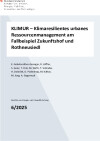
Für das Konzept des Zukunftshofs, einer innovativen urbanen Landwirtschaft, sollen durch Optimierungstools und parametrischem Design Entwicklungsszenarien für ein integriertes Energie- und Ressourcenkreislaufsystem entwickelt werden. Eine Roadmap, bestehend aus technischen Konzepten und einer abgestimmten Finanzierungsstrategie, soll die Grundlagen für ein Demoprojekt liefern, das in der Praxis zeigt, wie der Zukunftshof Ausgangspunkt und Basis für eine ressourceneffiziente und klimaresiliente Stadtentwicklung sein kann.
Schriftenreihe
6/2025
E. Gebetsroither-Geringer, R. Löffler, S. Geier, T. Fink, M. Wirth, T. Vobruba, H. Dolinšek, D. Podmirseg, M. Kaftan, M. Jung, A. Gugumuck
Herausgeber: BMK
Deutsch, 46 Seiten
Downloads zur Publikation
E_PROFIL - Quartiersprofile für optimierte energietechnische Transformationsprozesse
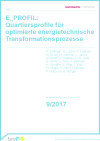
Mit E_PROFIL, als Methodenset zur Erstellung von Quartiersprofilen, wird ein wichtiger EDV-gestützter Werkzeugkasten geschaffen, der in der Planungspraxis österreichischer Städte zur Anwendung kommen wird, um eine energie- und ressourceneffiziente Stadtentwicklung zu unterstützen. Er ist ein wertvolles Asset für die Forschungs- und Planungsaktivitäten in Siedlungsverbänden.
Schriftenreihe
9/2017
R. Giffinger, D. Latzer, R. Kalasek, M. Ecker, M. Getzner, et al.
Deutsch, 211 Seiten
Downloads zur Publikation
Sondierung des wesentlichen F&E-Bedarfs zur Optimierung von städtischen Energiespeichern in integrierten Energiesystemen (CityStore)
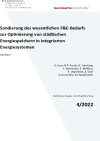
In CityStore wird erstmals ein innovativer Ansatz zur räumlichen Verortung von Speicherbedarf und -potentialen verfolgt. Dies inkludiert die Evaluierung der konkreten Herausforderungen und Voraussetzungen sowie die Identifikation von sinnvollen Speichertechnologien und -kapazitäten. Dazu werden Modellrechnungen für die Vorzeigestädte Graz und Weiz durchgeführt und die Verallgemeinerungsfähigkeit der Ergebnisse anhand der Follower-Region Südburgenland untersucht. Die Resultate sollen optimierte Planung und Realisierung von städtischen Energiespeichern ermöglichen – wodurch zielgerichtet in Energieinfrastruktur zur Umsetzung von (lokalen) Klima- und Energiezielen investiert werden kann.
Schriftenreihe
4/2022
D. Suna, N.P. García, G. Totschnig, S. Wimmeder, E. Meißner, R. Ungerböck, A. Graf, A. Dornhofer, M. Niederkofler
Herausgeber: BMK
Deutsch, 153 Seiten
Downloads zur Publikation
Building Information Modeling for Building Energy Management Systems (BIM4BEMS)
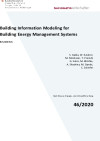
BIM4BEMS untersucht Anwendungsfälle, die den Nutzen eines BIM-Modells in Kombination mit Energiemanagementsystemen (BEMS) im Betrieb darstellen, die die Verbindung zwischen BIM und Gebäudeleittechnik (BMS) erlauben, und somit zu verbessertem Reporting und Erkennung von Ineffizienzen im bestehenden Gebäudebetrieb führen.
Schriftenreihe
46/2020
S. Gaida, W. Kastner, M. Montazer, T. Preindl, G. Suter, M. Blöchle, A. Shadrina, M. Sipetic, C. Schiefer
Herausgeber: BMK
Deutsch, 55 Seiten
Downloads zur Publikation
RENEWnow - Neue Impulse für die hocheffiziente energetische Sanierung von Geschoßwohnbauten und Quartieren
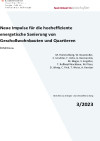
Sondierung eines innovativen Lösungsansatzes für die hocheffiziente Sanierung von Mehrfamilienhäusern in Österreich. Das Ziel ist durch einen gezielten, neuartigen Mix aus technischen und nichttechnischen Maßnahmen ein neues Dienstleistungsmodell (One-Stop-Shop) für Hausverwaltungen und Eigentümergemeinschaften zu entwickeln.
Schriftenreihe
3/2023
M. Hommelberg, W. Nussmüller, C. Urschler, F. Ochs, G. Dermentzis, M. Magni, V. Engstler, T. Roßkopf-Nachbaur, M. Ploss, D. Jähnig, C. Fink, T. Weiss, A. Knotzer
Herausgeber: BMK
Deutsch, 127 Seiten
Downloads zur Publikation
Urbaner Kältebedarf in Österreich 2030/2050 (UKÖ 2030/2050)
Systematische Aufarbeitung des steigenden Kühlbedarfs und Darstellung der geographischen Verortung des Kältebedarfs in Österreich. Das Ergebnis dient als Entscheidungshilfe bei der Entwicklung von Klimaschutzmaßnahmen und Klimawandelanpassungsstrategien sowie eine Abschätzung zum Kältebedarf der Zukunft.
StadtKlimaVISION - Vorbereitung eines urbanen Innovationslabors für klimaneutrale Stadtplanung: In Linz beginnt’s!
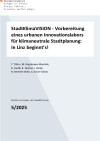
In StadtKlimaVISION wurde ein Innovationslabor für klimaneutrale Stadtplanung in der Stadt Linz konzipiert, mit dem Ziel, Instrumente der Stadtplanung stärker an Klimawandelanpassung und Klimaschutz auszurichten und Interessensgruppen aus Wirtschaft, Wissenschaft und Zivilgesellschaft einzubinden.
Schriftenreihe
5/2025
T. Tötzer, M. Bügelmayer-Blaschek, D. Havlik, B. Skarbal, J. Horak, N. Niemetz-Wahl, A. Geyer-Scholz
Herausgeber: BMK
Deutsch, 66 Seiten
Downloads zur Publikation
Digital Submission - Aufbereitung von Planungs- und Entscheidungsprozessen, Digitalisierung von Baubewilligungsverfahren (D-SUB)
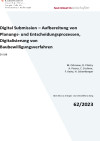
Ziel des Projektes war es, die Grundlagen für die Implementierung von digitalen Ablaufprozessen für Baubewilligungsverfahren in der Steiermark zu erarbeiten und zu evaluieren. Grundbaustein war die Erfassung, Aufbereitung und Validierung der IST-Prozesse von Baubewilligungsverfahren am Beispiel der Stadt Graz und der Gemeinde Stainach-Pürgg.
Schriftenreihe
62/2023
M. Ortmann, D. Plazza, A. Passer, C. Zechner, F. Kainz, H. Schamberger
Herausgeber: BMK
Deutsch, 77 Seiten
Downloads zur Publikation
Monitoring Mehrfamilienhäuser "Tonpfeifengasse"
Messtechnische Begleitung und Bewertung der Funktionsweise von Bauteilaktivierung als Speicher für Umweltenergien am Beispiel der Wohnhausanlage Tonpfeiffengasse.
Entwicklung von Beurteilungsmethoden für den Einsatz von Kleinwindenergieanlagen in urbaner Umgebung (Urbane Windenergie)
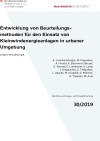
Im Projekt "Urbane Windenergie" wurden die Grundlagen für die technische Beurteilung des Einsatzes von Kleinwindenergieanlagen (KWEA) im urbanen Raum geschaffen. Dazu wurden einerseits Methoden zur Charakterisierung von turbulenten Strömungsfeldern entwickelt und andererseits die Auswirkungen von turbulenten Strömungsbedingungen anhand ausgewählter Turbulenzeigenschaften auf die Performance von KWEA analysiert. Auf Basis der Ergebnisse wurde ein Standort-Bewertungsschema für die Errichtung von KWEA im urbanen Raum entwickelt.
Schriftenreihe
30/2019
K. Leonhartsberger, M. Peppoloni, A. Hirschl, K. Baumann-Stanzer, S. Stenzel, C. Lotteraner, K. Leeb, J. Klappacher, C. Tiefgraber, L. Zajicek, M. Drapalik, D. Reiterer, R. Teppner, M. Auer
Herausgeber: BMVIT
Deutsch, 149 Seiten
Downloads zur Publikation
Low Tech – High Effect! Eine Übersicht über nachhaltige Low Tech Gebäude
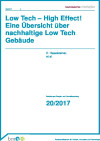
In dieser Studie wurden Ansätze von Low Tech Gebäuden näher betrachtet und besonders innovativ und repräsentativ erscheinende Konzepte detailliert dokumentiert. Ziel war es, den derzeitigen Stand der Technik und das vorhandene Know-how und Wissen anhand realisierter Beispiele aufzuarbeiten sowie Potenziale zur Weiterentwicklung aufzuzeigen.
Schriftenreihe
20/2017
Edeltraud Haselsteiner, Andrea Bodvay, Susanne Gosztonyi, Anita Preisler, Michael Berger, Bernhard Gasser
Herausgeber: BMVIT
Deutsch, 192 Seiten
Downloads zur Publikation
(Nudging-)Maßnahmen bei nachhaltigen Sanierungsprojekten
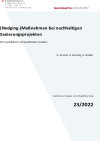
Auf der Grundlage einer soziologischen Kontextanalyse von ausgewählten Projekten der Programme „Haus der Zukunft“ und „Stadt der Zukunft“ und einer quantitativen Online-Erhebung unter NutzerInnen von Wohnobjekten werden unter verhaltensökonomischen Gesichtspunkten die relevantesten, durch Umbau- bzw. Sanierungsmaßnahmen verursachten Störfaktoren zusammengefasst und (Nudging-)Maßnahmen antizipiert.
Schriftenreihe
23/2022
K. Grosch, H. Kuschej, A. Walter
Herausgeber: BMK
Deutsch, 76 Seiten
Downloads zur Publikation
Forschungsinitiative „Zukunftssicheres Bauen“ – Phase 2 (2015–2018)
Ziel der Forschungsinitiative „Zukunftssicheres Bauen“ ist die Untersuchung ganzheitlicher Aspekte nachhaltigen Bauens als Beitrag zur zukunftsfähigen Weiterentwicklungen von Produkten und Dienstleistungen der Unternehmen der Stein- und keramischen Industrie. Die ÖGUT begleitet die Forschungsinitiative des Fachverbands der Stein- und keramischen Industrie und stellt den Ergebnistransfer zum Forschungsprogramm "Stadt der Zukunft" sicher.
SeasonalGridStorage - Innovative saisonale Wärmespeicher für urbane Wärmenetze

In diesem Projekt wurden Konzepte zur Nutzung innovativer Speichertechnologien, wie thermochemische Speicher (TCS) mit hohen Energiedichten und der Möglichkeit der druck- und verlustlosen Speicherung entwickelt und mit Hilfe von Simulationsrechnungen in technischer, ökologischer und wirtschaftlicher Hinsicht untersucht sowie rechtliche Randbedingungen bewertet.
Schriftenreihe
21/2018
M. Köfinger, D. Basciotti, D. Lager, O. Terreros, C. Zauner, H. Böhm, J. Lindorfer, R. Tichler, A. Zauner
Herausgeber: BMIT
Deutsch, 151 Seiten
Downloads zur Publikation
M-DAB2: Material intensity of inner development - resource assessment and localization of urban development potentials
For the first time, the material intensity of inner development (in terms of material quantities) for different design variants was considered in the evaluation of inner development potentials. A set of methods for the holistic evaluation of potential areas and different development variants and scenarios for resource-saving inner development was created.
Programmevaluierung "Stadt der Zukunft" 2013 - 2021
Im Rahmen dieser Evaluierung wurde überprüft, welche Wirkungen das Programm "Stadt der Zukunft" seit seiner Einführung erzielen konnte. Die Basis dafür bilden umfangreiche Befragungen von Projektnehmer:innen aus der Forschung und Multiplikatoren und Multiplikatorinnen aus Anwendungsgebieten wie der Ziviltechnik und Stadtplanung. Die Evaluierung schafft damit eine wichtige Grundlage für die Gestaltung von zukünftigen Forschungsförderungen.
Kleinmaßstäbliche Nachverdichtung in modularer Bauweise (Intensified Density)
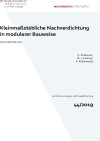
„Intensified Density“ hat untersucht, ob eine kleinmaßstäbliche Verdichtungsstrategie für die Vorstädte / Zwischenstädte mittels einer modularen Bauweise eine konkurrenzfähige Alternative sowohl zu den sich ausbreitenden Einfamilienhaussiedlungen als auch zu Großprojekten darstellen kann, bei Nutzung von vorhandener Infrastruktur.
Schriftenreihe
44/2019
P. Petersson, Ch. Linortner, P. Kickenweitz
Herausgeber: BMVIT
Deutsch, 72 Seiten
Downloads zur Publikation
Konzeption eines Test- und Demonstrationsgebiets für Wohnen und Mobilität im Umfeld von Haltestellen im oberösterreichischen Zentralraum (Suburbahn)
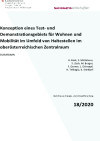
Zielgerichtete, prozessorientierte Konzeption für die Umsetzung und den Betrieb eines Test- und Demonstrationsgebiets für Stadtentwicklung und Mobilität in Ansfelden unter Einbindung relevanter Forschungsakteurinnen und -akteure, lokaler und regionaler Stakeholder, EntscheidungsträgerInnen sowie der interessierten Bevölkerung im Sinne eines „Living Lab“-Ansatzes.
Schriftenreihe
18/2020
H. Bork, S. Müllehner, S. Zech, M. Berger, F. Dorner, L. Dörrzapf, H. Tellioglu, K. Stieldorf
Herausgeber: BMK
Deutsch, 110 Seiten
Downloads zur Publikation
PVOPTI-Ray: Optimierung reflektierender Materialien und Photovoltaik im Stadtraum bezüglich Strahlungsbilanz und Bioklimatik
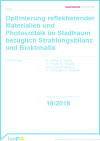
Im Rahmen des Projektes PVOPTI-Ray wurde der Einfluss der Reflexion und der Strahlungsbilanz in städtischem komplexem Gelände auf die Performance von fassadenintegrierter Photovoltaik (PV) untersucht. Ebenso wurde der Einfluss der Solarmodule und der Strahlungswandlung an Solarmodulen auf das Stadtklima analysiert.
Schriftenreihe
18/2018
P. Weihs, S. Zamini, S. Krispel, S. Oswald, M. Peyerl, M. Revesz, A. Schneider, H. Trimmel
Herausgeber: BMVIT
Deutsch, 98 Seiten
Downloads zur Publikation
Lightyard - Vom Innenhof zum Lichthof
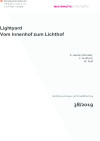
Es wurde untersucht, ob die intelligente Anordnung unterschiedlicher Materialien tageslicht-technisch optimale Lösungen für die Sanierung von Innenhöfen ermöglicht. Das Anheben der Tagesbelichtung in unteren Geschoßen auf mehr als das 10-fache ist damit realistisch. Zusätzlich wurde ein Berechnungstool konzipiert, mit dem optimierte Innenhoflösungen erstellt werden können. Dabei werden lichttechnische, wirtschaftliche und bautechnische Kriterien berücksichtigt.
Schriftenreihe
38/2019
D. Geisler-Moroder, C. Knoflach, W. Pohl
Herausgeber: BMVIT
Deutsch, 40 Seiten
